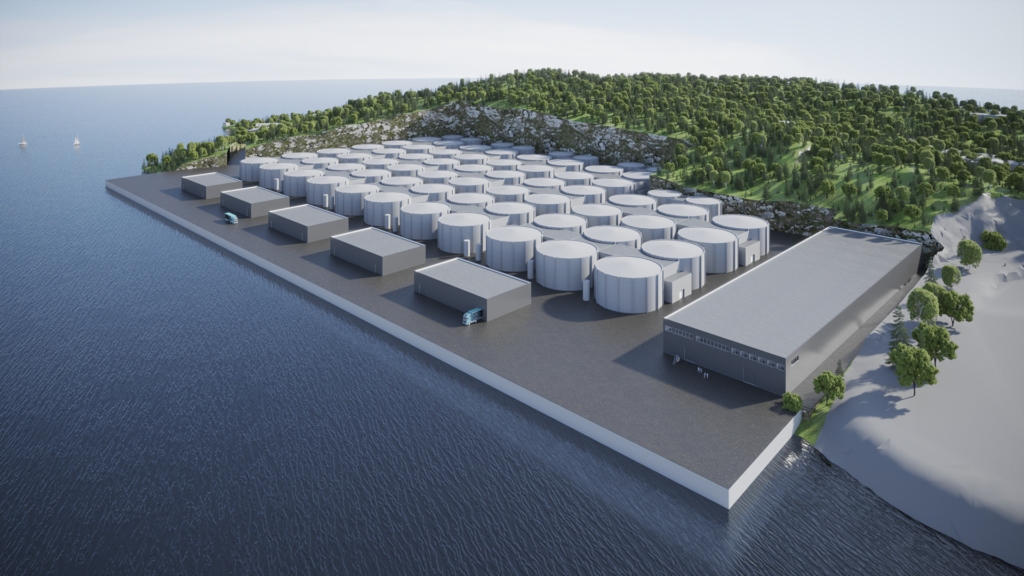Salfjord secures permit for 21,000 tonne farm

Salmon producer Salfjord has been given the green light for a land-based farm in the Nordmøre region in western Norway.
The permit, for a maximum 21,000 tonnes of standing biomass, was granted by Møre og Romsdal county council. The farm will be sited at the Tjeldbergodden industry park in Aure municipality.
The permit is equivalent to 27 licences for conventional fish farming in the sea, with an annual output of 36,500 tonnes of head-on gutted (HOG) salmon, or up to 500,000 salmon meals per day throughout the year.
It also allows the production of 30 million smolt per year, which the company said provides great flexibility for its plans.
The new farm will operate a hybrid flow-through system, similar to that adopted by Salmon Evolution for its own site at Indre Harøy.
Salfjord is now working to secure additional strategic and industrial investors in order to implement a new share issue during 2023.
Co-founder and CEO Hans Ramsvik said: “We’ve worked purposefully on this for a long time, and are very pleased that the permit is now in place.
“We’re now looking forward to a dialogue in finding the right partners and exploring financing models. Attention in future will concentrate on building the organisation, risk management and speeding up detail design work.”
The estimated price tag for the completed plant, fully developed, is NOK 7-7.5bn (£513m-£550m).
Salfjord will be working closely with RAS (recirculating aquaculture systems) specialist Artec Aqua, whose deliveries include similar technology under a virtually identical turnkey contract to Salmon Evolution a little further south in the county.
“Having Artec Aqua on the team reduces uncertainty for construction time and costs,” says Ramsvik. “Thanks to its hybrid system – a flow-through solution with recycling of up to 65% of the water quantity – we’ll also overcome technological, operational and biological challenges.”
The hybrid solution, Salfjord said, provides the best cost/benefit effect where water needs to be heated. The company believes that with the constant provision of 35%-40% fresh seawater and a division into closed zones, this technology has already demonstrated that it poses a low biological risk.
CEO Ramsvik also said: “The permit for smolts makes us self-sufficient for these, and gives us great flexibility in relation to our production plans,” says Ramsvik.
“Our upscaling ambitions extend beyond the Tjeldbergodden facility, and we’re expecting to secure planning permission soon for a further location in Aure local authority.”
Risk will be managed during production on the basis of modern barrier management as recommended by risk management and fish health specialist DNV.
A process and energy simulator has been developed by Salfjord in close collaboration with engineering business ABB, and a “digital twin” of the plant will be used by the company in its process and risk management.
Backed by accurate historical and real-time data, the company will thereby secure close control and optimisation of such production parameters as maintenance, energy efficiency and fish welfare.
Biosecurity will be a high priority, with cleaning and very strong disinfection of intake and outlet water to prevent illness entering and exiting the facility. Fish transport in and out will be enclosed, with no release of water.
Salfjord is also looking at circular economy solutions to save energy and reduce the operation’s carbon footprint, such as making use of waste heat from Equinor’s nearby methanol factory.
Ramsvik said: “We want to take the opportunity to invite all our neighbours as well as partners new and old to a dialogue and a collaboration which can ensure overall progress for all players and local communities in and around Tjeldbergodden.
“In our view, we can thereby collectively help to boost aquaculture and other industries in the district.”

Salfjord’s proposed salmon farm, Aure municipality – illustration

